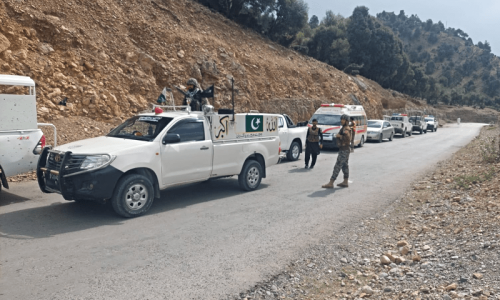PESHAWAR: The government-run Institute of Kidney Diseases at Hayatabad Medical Complex stopped transplants after scores of patients contracted drug-resistant organism infections at the operation theatres, according to sources.
They said that non-sterilisation and non-observance of standard operating procedures led to stoppage of kidney transplants at the only public sector institute recognised by Medical Transplant Regulatory Authority for renal transplants of poor people.
Prof Nasir Aurakzai, the director of IKD, told Dawn that there was a complaint regarding infections from operation theatres for which swabs would be collected for culture.
“We regularly keep a check on infection control. Till the last check, things were under control but as said above fresh culture swabs are being taken. Other preventive measures are also being reviewed,” he said.
However, sources said that there was evidence that they had recorded over 100 patients, who developed multi-drug resistant pseudomonas aeruginosa that caused severe infections. They said that the infections were drug-resistant and didn’t respond to any medication. These hospital-acquired infections were now widespread as doctors had limited scope of surgeries, they added.
Prof Nasir says preventive measures being reviewed
Sources said that operations at the institute were in progress and on average 25 were operated upon every day. The administration had to close and fumigate the operation theatres to sterile them and prevent infections to the people, they added.
IKD has performed 20 kidney transplants free of cost. The cost of one procedure is Rs1.5 million in private health facilities.
“The relatives of a person, who is alive on dialysis, had to face sever embarrassment when they were told about the decision to stop transplant due to infected operation theatres,” said sources.
The relatives of the patients said that they had been struggling to find donor and carry out all legal formalities after one year because they didn’t have amount to pay to private hospitals.
Sources said that 10 more patients were in pipeline for transplants as they had arranged donors and waiting to undergo transplants but surgeons did not take chance of putting lives of people in danger because the infections were fatal.
A meeting of urologists, according to sources, has suggested strict adherence to the protocols of operation theatres. They said that infection surfaced in July last year and affected patients were tested from the country’s reputed laboratories that showed sever infections.
They said that three months ago, surgeons removed a kidney that had been transplanted to a person days before sever infection. The patient had spent about Rs1 million in an Islamabad-based hospital but was not well, they added.
According to protocol, it would cost around Rs250,000 to fully screen the operation theatres to trace source of infection and take disinfection measures because all operations required sterilisation.
Machines for anaesthesia and diathermy; lights; floors; walls; air; and roof etc of the operation theatres should be screened and cleaned in accordance with the SOPs.
Sources said that infections spread as the overcrowded operation theatres were visited by trainee students of private paramedical institutes and the staffers, who did not follow protocols. The operation theatres remain open for 24 hours as opposed to the city’s teaching hospitals where these are closed before 4pm to be cleaned for next morning.
Prof Asif Malik, the chairman of urology department at IKD, said they had stopped transplants due to infections to the patients and requested the administration to ensure sterilisation to prevent complications.
Prof Nasir said that the evidence available till now could not verify the claim of some doctors that there was a definite infection source in the operation theatres but definite answer would be available soon.
“As doubts are being raised about the OT asepsis and reluctance to perform the procedure then I have to ensure that such doubts are clarified,” he said.
Published in Dawn, January 28th, 2020












































Dear visitor, the comments section is undergoing an overhaul and will return soon.